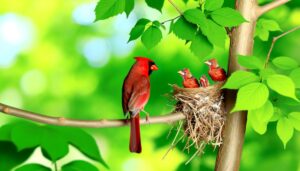How to Determine If Cat Food Is Safe for Cardinals to Eat
Feeding bird food to cardinals isn't safe. Bird food contains excessive protein and inadequate nutrient profiles for cardinals' health needs.
High protein levels can strain their kidneys and liver, while lacking essential vitamins and antioxidants necessary for their well-being. Additionally, the sodium content in bird food can cause hypertension and kidney damage in birds.
Cardinals require a balanced diet of seeds, fruits, and insects to maintain peak health and reproductive success. To prioritize cardinals thrive, it's essential to prioritize their specific dietary needs.
Discover more about the best practices for feeding cardinals and promoting their health.
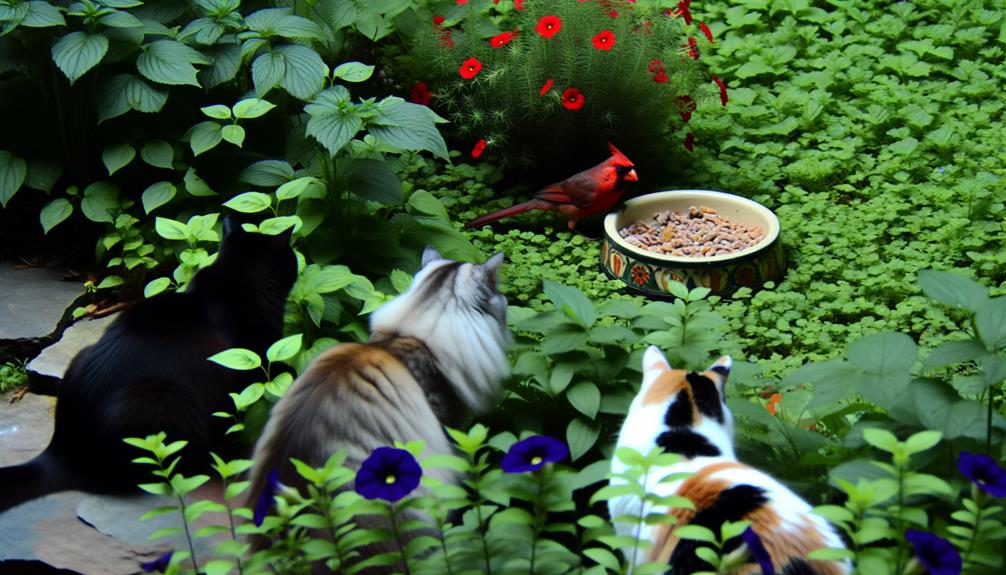
Key Takeaways
- Cat food's high protein content can strain cardinals' kidneys and liver.
- Cat food lacks essential vitamins and minerals necessary for cardinals' health.
- Excessive sodium in cat food can cause hypertension and kidney damage in cardinals.
- Feeding cat food can lead to nutritional deficiencies and weakened immune systems in cardinals.
- A balanced diet of seeds, fruits, and insects is crucial for cardinals' well-being.
Cardinal Dietary Needs
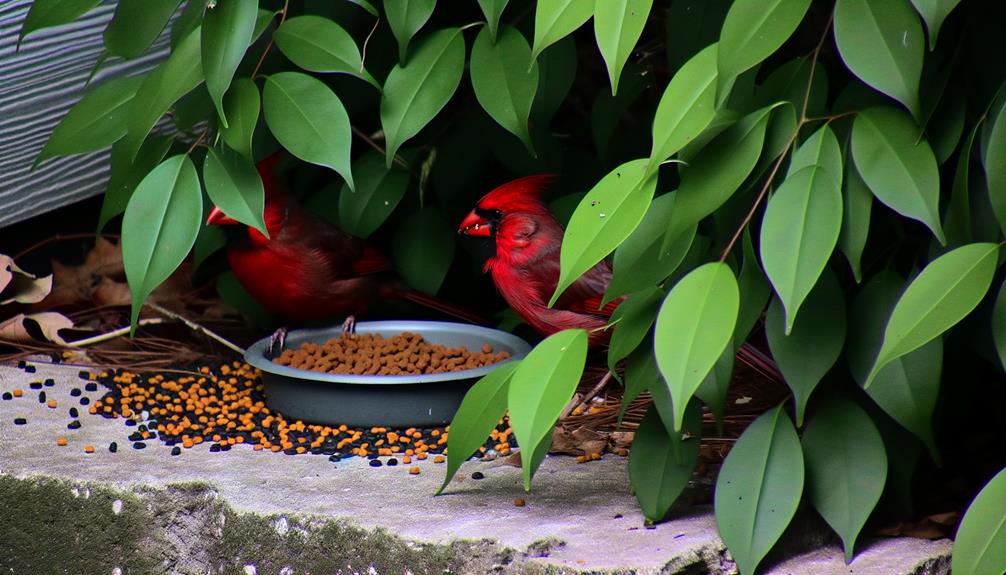
Cardinals need a diet rich in seeds, fruits, and insects to meet their nutritional needs. You'll find that sunflower seeds, safflower seeds, and various berries provide necessary vitamins and antioxidants.
Insects like beetles and caterpillars offer crucial protein, aiding in muscle development and feather health. Evidence indicates that these dietary components are important for best health and reproduction.
Deviation from this natural diet can lead to nutritional deficiencies, impaired immune function, and reduced breeding success. It's vital to make sure that cardinals have access to their native food sources.
Common Cat Food Ingredients
When considering whether cardinals can safely consume cat food, you should examine its common ingredients. Cat food typically contains high-protein sources such as meat or fish, along with various additives and preservatives.
Understanding these components is essential to determine their impact on a cardinal's health.
Protein Sources in Cat Food
In cat food, protein primarily comes from sources like poultry, fish, and meat by-products, ensuring high biological value for feline nutrition.
You'll find that poultry such as chicken and turkey provide essential amino acids essential for maintaining a cat's muscle mass and overall health.
Fish, rich in omega-3 fatty acids, supports skin and coat health while also offering a robust protein source.
Meat by-products include organs and bones, which aren't only high in protein but also offer crucial nutrients like vitamins and minerals.
These proteins are formulated to meet the stringent dietary requirements of cats, emphasizing their obligate carnivore nature.
Understanding these sources helps you grasp how cat food is tailored to meet specific nutritional needs.
Additives and Preservatives
While protein sources are essential, understanding the additives and preservatives in cat food is equally important for assessing its overall safety and nutritional value. Additives like artificial colors, flavors, and preservatives can impact the health of cardinals. Studies show that some common ingredients may be harmful. For example, Ethoxyquin, a preservative, is linked to liver and kidney damage. BHA and BHT, although approved by FDA, have raised concerns regarding their potential carcinogenic effects.
Here's a table summarizing common additives and their implications:
| Additive | Potential Effects |
|---|---|
| Ethoxyquin | Liver and kidney damage |
| BHA/BHT | Potential carcinogens |
| Artificial Colors | Behavioral changes |
| Propylene Glycol | Toxic to birds |
| Sodium Nitrite | Blood oxygenation issues |
Assessing these factors helps you make informed decisions.
Protein Content Analysis
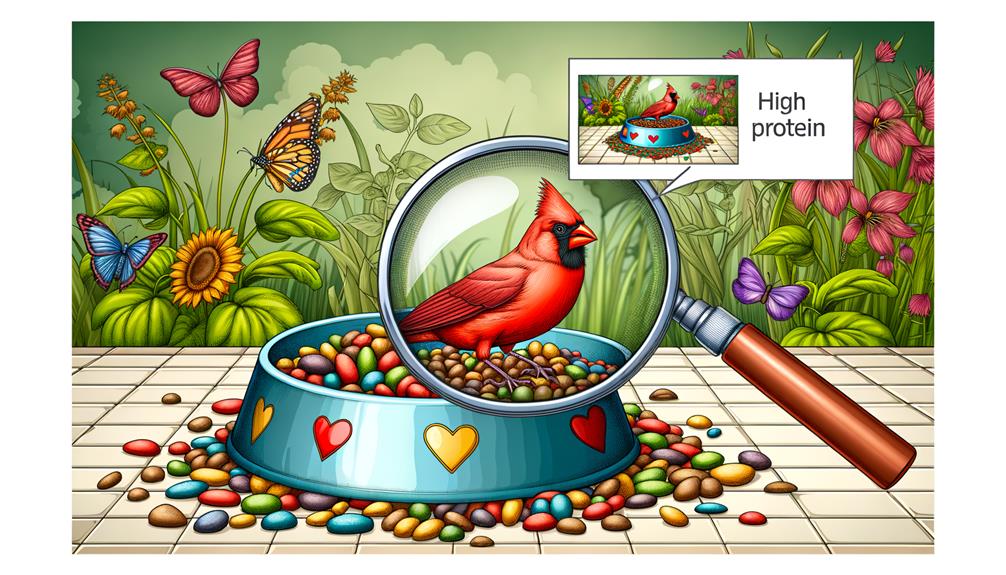
You should compare the protein levels in cat food to the dietary needs of cardinals to determine compatibility.
Cat food generally contains higher protein levels than what cardinals typically require.
Evaluating this difference is essential to understanding the potential health risks for these birds.
Protein Levels Comparison
Cardinals require a diet with approximately 20% protein, whereas typical cat food often contains protein levels exceeding 30%, potentially offering more than what these birds need. This disparity in protein content can lead to an imbalance in their dietary intake. Studies indicate that excessive protein may strain a cardinal's kidneys and liver, potentially leading to health complications.
You should be aware that feeding cardinals cat food might disrupt their nutrient absorption balance. High protein levels in cat food are formulated specifically for feline metabolism, not avian physiology. Hence, while occasionally consuming such food may not be immediately harmful, consistently offering it might undermine the cardinals' long-term health.
Always prioritize species-specific dietary requirements to guarantee their well-being.
Dietary Needs Compatibility
Considering the potential health risks associated with high protein levels in cat food, it's essential to analyze how the protein content in a cardinal's diet aligns with their specific nutritional needs. Cardinals require a balanced diet with a moderate protein content, typically around 15-20%.
Cat food, designed for obligate carnivores, often contains protein levels exceeding 30%, which can overwhelm a cardinal's digestive system. Additionally, excess protein can lead to kidney strain and metabolic issues in birds.
Evaluating the protein compatibility is vital for ensuring the cardinal's overall health and longevity. While cat food might be readily available, it doesn't conform to the precise dietary requirements necessary for maintaining the best well-being of these vibrant songbirds.
Potential Health Risks
Excessive protein intake from cat food can cause significant health issues for cardinals, such as renal strain and metabolic complications. Unlike cats, cardinals don't require high-protein diets. Their kidneys aren't designed to process the elevated protein levels found in cat food, leading to renal strain.
Studies have shown that avian species on high-protein diets can experience uric acid buildup, increasing the risk of gout and kidney damage. Additionally, metabolic complications can arise due to the imbalance in essential nutrients, potentially causing long-term health deterioration.
If you're feeding wild birds, prioritize foods formulated for their specific dietary needs to make sure they're getting balanced nutrition without unnecessary risks. Avoid cat food to promote their overall well-being.
Potential Health Risks
Although cat food contains proteins and fats, its high sodium content and lack of essential nutrients pose significant health risks for cardinals. Sodium can lead to hypertension and kidney damage in these birds.
Furthermore, cat food lacks crucial nutrients such as calcium, which is essential for bone health, and carotenoids, necessary for their vibrant plumage. Feeding cardinals cat food regularly can result in nutritional deficiencies, weakening their immune systems and making them more susceptible to diseases.
The imbalance of nutrients can also impair reproductive success, affecting their overall population. To guarantee cardinals thrive, you should provide them with a diet specifically formulated for their nutritional needs, such as seeds, fruits, and insects.
Expert Opinions
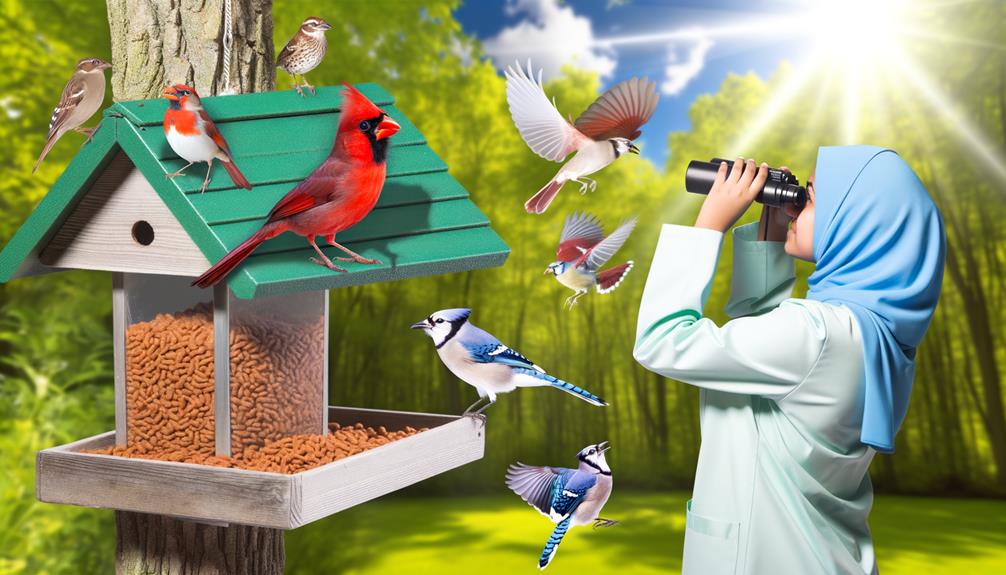
Leading ornithologists assert that feeding cardinals cat food can severely compromise their health due to its inappropriate nutrient profile. Cat food is formulated specifically for feline dietary needs, which differ vastly from those of birds. Experts emphasize that providing the wrong nutrition can lead to significant health issues in cardinals.
- Protein Imbalance: Cat food contains higher protein levels, potentially causing kidney damage in cardinals.
- Lack of Essential Nutrients: Cardinals require specific vitamins and minerals not present in cat food.
- Digestive Problems: Birds have different digestive systems, making it challenging for them to process cat food.
- Behavioral Changes: Inadequate nutrition can impact a cardinal's natural behaviors and energy levels.
It's crucial to follow expert advice to guarantee the well-being of these beautiful birds.
Safe Alternatives
For maintaining the health and well-being of cardinals, it's crucial to consider bird-specific foods rich in appropriate nutrients. Choose sunflower seeds, safflower seeds, and millet, as these provide essential fatty acids and proteins.
Include fruit such as berries and apples, which offer important vitamins and antioxidants. Additionally, mealworms and suet can be excellent protein sources, promoting muscle development and energy.
Avoid foods high in salt, sugar, or artificial additives. Evidence shows that balanced diets specifically tailored to cardinals support their immune system and longevity.
Best Practices for Feeding
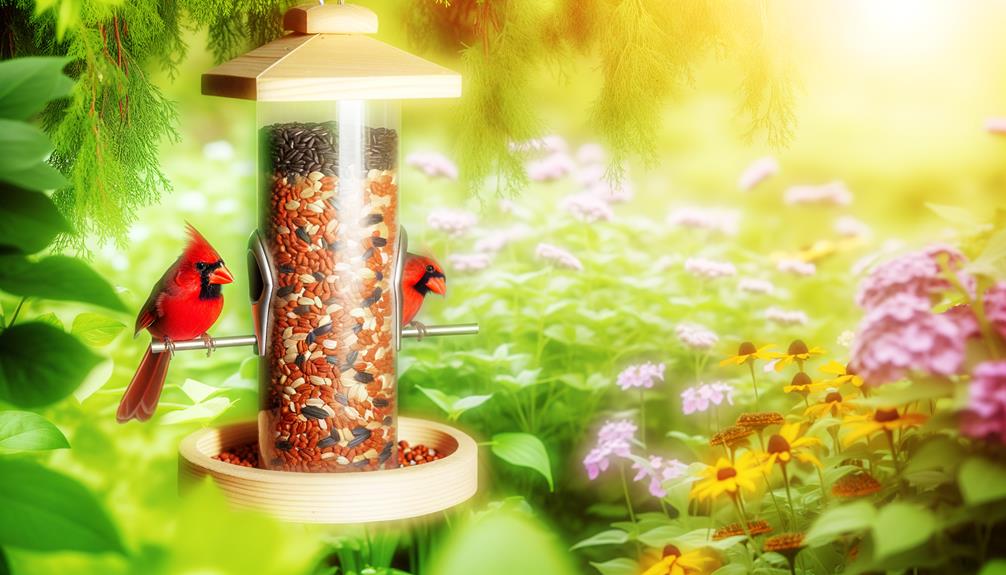
Ensuring cardinals receive peak nutrition requires adhering to evidence-based feeding practices tailored specifically to their dietary needs. You should prioritize natural food sources that align with their omnivorous diet, ensuring they receive essential nutrients for prime health.
Avoid using cat food as a primary sustenance, as its nutritional profile doesn't meet avian requirements.
Use these best practices:
- Offer a variety of seeds: Sunflower, safflower, and millet provide balanced nutrition.
- Provide fresh fruits: Apples, berries, and grapes support dietary diversity.
- Incorporate insects: Mealworms and crickets boost protein intake.
- Maintain cleanliness: Regularly clean feeders to prevent disease.
Conclusion
Imagine feeding a cardinal cat food is like offering a marathon runner only candy bars. While cat food contains high protein, it lacks essential nutrients cardinals need, like seeds and fruits.
Studies show inappropriate diets can lead to malnutrition and health issues in birds. Experts unanimously recommend species-specific diets.
For best health, provide cardinals with a balanced mix of birdseed, fruits, and insects. It's essential for their vigor and longevity.

